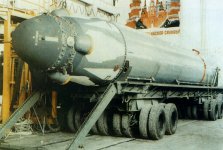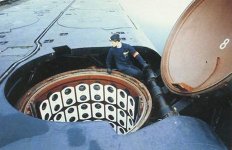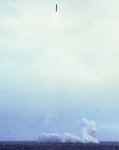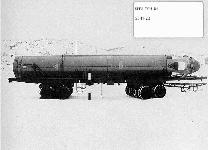




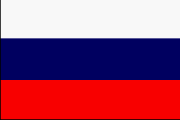
The R-29RM is a three-stage liquid-propellant missile carrying four or ten MIRV. Compared to the R-29R the missile has a larger launch weight (40.3 to 35.5 Tons) providing a heavier payload (2800 kg to 1650 kg) to a greater maximum range (8300 to 8000 km). The R-29M incorporates a number of significant design changes relative to the predecessor R-29R
Relative to the R-29R, the diameter of the R-29RM was increased from 1.8 meters to 1.9 meters, which allowed an increase in propellant loading. The new missile's length was increased only slightly, from 14.1 meters to 14.8 meters, allowing the overall dimensions of the launching tube to remained constant. The D-9RM launch system for the R-29RM missiles is based on the D-9R system.
Unlike the R-29 and R-29R, the propulsion system of the first stage has four control chambers. The engines of all three stages are located in the tanks. The third stage propulsion system and the post-boost vehicle propulsion system use the same fuel tanks. The warheads are placed in an internal cavity of the concave conical bottom of the upper tank of the second stage at the periphery of the sustainer of the third stage.
NII Mashinostroyeniya began work on the development of the D-9RM launch system and the R29-RM in 1979. A series of vehicle development launches from a floating platform was conducted initially, followed by 16 flight tests from a ground platform and submarine tests. Deployment of the D-9RM launch system began in 1986.
Seven Deltra IV submarines were equipped with the D-9RM launch system. They carry 16 R-29RM missiles containing four warheads each. The R-29RM missiles carrying ten warheads were not deployed.
In 1988 the launch system was modernized providing improved accuracy, and for firing the missiles on depressed trajectories. At that time the missile was also equipped with improved warheads.
In late 1999 Russia announced plans to resume production of the SS-N-23. he state missile center Design Agency named after V. P. Makeev received a state order from the Russian government to resume the manufacture of naval missiles, including the most advanced RSM-54 system developed by the Agency when Victor Makeev was its general designer. While deployed with four warheads for the START I treaty, it was originally tested with 10 warheads and might be deployed with that number in the absence of such arms control agreements. It has been suggested that some of these liquid-fuel missiles could be deployed on land in the absence of the START agreements. T
Specifications |
||
|
DIA |
SS-N-23 |
|
|
NATO |
Skiff |
|
|
Bilateral |
RSM-54 |
|
|
Service |
R-29RM |
|
|
OKB/Industry |
3M37 |
|
|
Design Bureau |
NII Mashinostroyeniya |
|
|
Approved |
||
|
Years of R&D |
||
|
Engineering and Testing |
||
|
First Flight Test |
June 1983 |
|
|
IOC |
||
|
Deployment Date |
1986 |
|
|
Launch system |
D-9RM with 16 missiles |
|
|
Submarine |
||
|
Type of Warhead |
MIRV |
|
|
Warheads |
4 (tested with 10) |
|
|
Yield (mt) |
||
|
Payload (t) |
2800 |
|
|
Total length (m) |
14.8 |
|
|
Total length w/o warhead (m) |
||
|
Missile Diameter (m) |
1.9 |
|
|
Diameter of Stabilizers (m) |
||
|
Launch Weight (t) |
40.3 |
|
|
Fuel Weight (t) |
||
|
Range (km) |
8300 |
|
|
CEP (m) (Russian Sources) |
500 |
|
|
CEP (m) Western Sources) |
||
|
Number of Stages |
2 |
|
|
Warheads Deployed |
||
|
Booster guidance system |
astroinertial |
|
|
1st stage |
2nd stage |
|
|
Length (m) |
||
|
Body diameter (m) |
||
|
Fueled weight (t) |
||
|
Dry weight (t) |
||
|
Engine Designation |
||
|
Propellants |
Liquid |
|
|
Fuel |
Nitrogen Tetraoxid |
Nitrogen Tetraoxid |
|
Oxidizer |
UDMH |
UDMH |
|
Burning time (s) |
||
|
Verniers Thrust Sea Level/Vacuum (kn) |
||
|
Specific Impulse (s) |
||
|
Launching Technique |
Underwater wet start/ surface |
|
|
Firing conditions |
|
|

